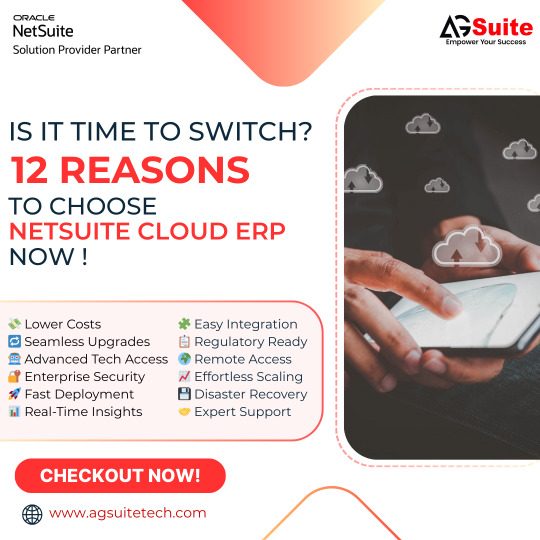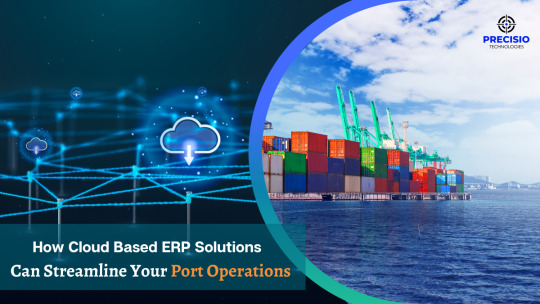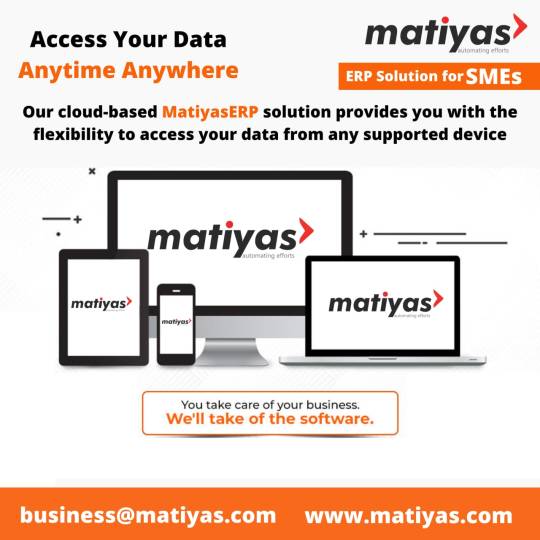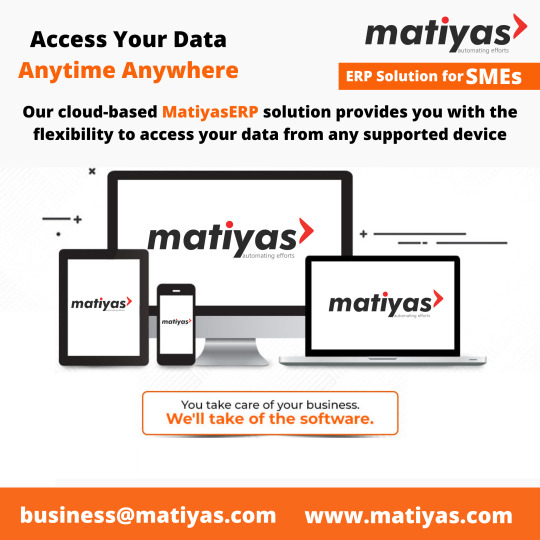#clouderpsoftware
Explore tagged Tumblr posts
Text

It’s always great to have you in our office, Team Leonardo Carvalho.
As always, it was a pleasure engaging in such meaningful discussions and spending quality time with you and the team.
Looking forward to more such engaging interactions and continued collaboration!
Dilip Sadh
Leonardo Carvalho
Marcos Paulo de Souza Lopes
Guilherme Goulart (Memo)
Mona T
Shital Panchal
#Teamwork #Leadership #Collaboration #ProfessionalGrowth #erpsoftware #SAPBusinessOne #SAPB1 #AffordableERP #ERPforSME #smallbusinesschallenge #smallbusiness #smallbusinesssupport #smallbusinessowner #clouderp #clouderpsoftware #saperp #erpsolutions #erpintegration #team
#Teamwork#Leadership#Collaboration#ProfessionalGrowth#erpsoftware#SAPBusinessOne#SAPB1#AffordableERP#ERPforSME#smallbusinesschallenge#smallbusiness#smallbusinesssupport#smallbusinessowner#clouderp#clouderpsoftware#saperp#erpsolutions#erpintegration#team
0 notes
Text
Why Move to Cloud ERP? 12 Reasons & Benefits
Businesses often rely on enterprise resource planning (ERP) systems to consolidate and organize information across the organization. Historically, companies installed ERP software on local servers and other infrastructure they owned, now commonly referred to as on-premises.
While these on-premises solutions helped businesses run smarter and led to major benefits, there are some areas where they fall short, most notably when it comes to cost, agility, and maintenance. Cloud-based ERP systems resolve many of the issues that come with on-premises solutions and offer a number of advantages over their on-site counterparts.
But what, exactly, is cloud-based ERP, and why would an organization want to move this crucial business system to the cloud — often with the help of a NetSuite Implementation Partner?
What Is Cloud ERP? Generally speaking, ERP systems, such as NetSuite ERP, integrate operations across finance, inventory and order management, supply chain management, human resources and more, leading to business process improvements for 95% of the businesses that use them.
Unlike on-premises systems, however, cloud-based ERP software runs on cloud vendor servers accessed over the internet. There are multiple versions of cloud ERP. Some cloud vendors merely manage the same on-premises software in their own data center and deliver it to customers via the internet, known as hosting. Another more popular model is Software-as-a-Service (SaaS). SaaS operates with a multi-tenant architecture, meaning all customers are running on the same version of the software, separated at the database level. This creates economies of scale because the vendor only has to maintain one code base, and all customizations and integrations—especially when supported by a NetSuite Implementation Partner—carry forward automatically with each upgrade. Upgrades also require little effort on the part of customers and are more frequent in the SaaS model.
Why Move From On-Prem to the Cloud? On-premises systems require customers to maintain the servers and other hardware within their own data center. These on-site systems often require a significant investment of hardware, ERP software, space and personnel to implement and keep them running. Upgrades are also problematic because many businesses heavily customize the software to their unique needs.
When the vendor releases enhancements in the form of an upgrade, customizations and integrations need to be tested and users may need to be retrained, which can result in significant disruptions to the business—sometimes as much as a new implementation. As a result, many businesses forgo upgrades and find themselves stuck on older versions of the software, sometimes known as "version lock."
Generally, cloud ERP solutions offer a more efficient approach, letting companies take advantage of tremendous computing power. Shifting from on-premises to NetSuite ERP software typically offers lower upfront costs, faster implementation and reduced physical and staff resource usage. When supported by a trusted NetSuite Implementation Partner, the transition becomes even smoother and more strategic. Companies can become more agile with cloud-based systems because they are highly adaptable and scalable. It also allows leaders to focus on running their business and finding ways to grow, since it offloads all work related to bug fixes, patches and upgrades to the vendor

12 Reasons to Move to Cloud ERP There are many reasons why a company might move from on-premises to cloud ERP, but here are some of the biggest ones:
Lower costs
Upgrades and maintenance
Access to Emerging Technology
Security
Implementation
Real-time data
Easier customization
Simplified compliance
Accessibility
Scalability
Disaster recovery
Peace of mind
Read more: https://agsuitetech.com/blog/why-move-to-cloud-erp-12-reasons-and-benefits/
Make the Case to Move to the Cloud Despite these benefits, many decision-makers may still question the need to move to a cloud ERP platform
Making the business case for cloud ERP starts with recognizing what this type of system can do for the company, such as cutting costs, increasing revenue, optimizing resources and processes, or solving specific issues.
After identifying these items, decision-makers need to establish the value that addresses the organization's issues. This value can be in the form of tangible quantitative benefits (e.g., revenue increases or cost savings) or indirect qualitative benefits (e.g., increased productivity). A NetSuite Implementation Partner can be instrumental in helping businesses articulate this value and align their ERP strategy with long-term growth objectives.
How do the subscription fees of a cloud ERP solution compare to the existing on-premises system's upfront licensing costs?
How much will a cloud-based ERP expected to save in terms of maintenance and support, hardware, data center, staff, and other IT costs?
How will each business unit benefit?
How will it make operations such as inventory management, revenue recognition, analytics, and organization-wide forecasting smoother and more straightforward?
Another critical aspect to consider is that many on-premises ERP providers are making the shift to cloud ERP themselves. In many cases, vendors are deprioritizing the development and support of customers' legacy on-premises systems, making it difficult to maintain and upgrade the software and infrastructure. Even when businesses choose to move to a cloud ERP system, the upgrade is basically a new implementation all over again. This makes it wise to shop around and engage with an experienced NetSuite Implementation Partner to ensure costs, functionalities, and operational needs are fully met—rather than sticking with the same provider simply out of familiarity.
In addition to the common benefits of cloud ERP mentioned above, the expected return on investment (ROI) from implementing a robust solution like NetSuite ERP is often critical to decision-makers. The ERP ROI formula is:
ROI = ERP financial benefits/Total cost of ownership
It's calculated by dividing the expected amount that the ERP system has contributed to the bottom line by the total cost of ownership of the system and then multiplying the resulting figure by 100 to get a percentage. For these purposes, the financial benefits include direct benefits such as increased sales and indirect benefits such as cost savings. The TOC includes implementation, subscription fees, personnel, training, and maintenance. So, for example, a cloud ERP system, such as NetSuite ERP, that has a total expected benefit of $100,000 and a total cost of implementation of $75,000 sees an ROI of 133%.
The return on investment is of particular interest to CFOs and other financial decision-makers who want to minimize capital expenditures while reducing operating costs. The most prominent ERP solution champions are often the finance and accounting staff — a survey of 255 companies found that 89% of respondents identified accounting as the most critical ERP function.
A significant driver of this sentiment from CFOs is the desire to control the unplanned costs of running an on-premises ERP system, such as servers going down, network switches breaking, hardware failure, data loss, etc. In short, each component of an on-premises system represents a possible unexpected expenditure. Cloud ERP technology, especially when implemented with the help of a trusted NetSuite Implementation Partner, eliminates most of those moving parts and mitigates many unplanned spends by significantly reducing capital expenditures on hardware and software, implementation, and IT staff. The subscription model also provides more predictable costs.
Essentially, making the business case to move to cloud ERP, such as NetSuite ERP, means developing a narrative for change and supporting that narrative with concrete figures.
Success Stories in the Cloud
For many businesses, shifting from on-premises to cloud ERP has been a rewarding move. These businesses typically cite the speed at which cloud ERP can be implemented, the substantial cost savings, and how NetSuite ERP supports growth. Engaging a knowledgeable NetSuite Implementation Partner often plays a pivotal role in ensuring a smooth transition and maximizing ROI.
Fast Deployment
Companies that choose a cloud ERP solution can benefit from its faster and simpler implementation. It allows companies to hit the ground running with scalable functionality that enables quick adjustments and can support new initiatives. Partnering with a knowledgeable NetSuite Implementation Partner can further streamline deployment and reduce risk.
For example, after separating from its former parent company Intuit, Quicken needed to make a quick switch from Intuit's ERP system to NetSuite ERP as a condition of its reorganization. NetSuite's cloud-based ERP system made the migration easy and minimized issues during a tumultuous time.
Likewise, cloud-based ERP enabled office supply distributor Sourcing Partner to replace its inventory and logistics technology to meet the rapidly increasing demand of an expanded customer base and new product lines. Sourcing Partner implemented NetSuite in just 95 days — just in time for the busiest season of the year.
Cost Savings
Cloud ERP can offer significant cost savings, both in its functionality and TCO. Distributor Right Way Medical, for example, needed to replace its mix of five systems — including QuickBooks and Excel — with a holistic, cloud-based ERP. The company now runs on just NetSuite, plus its proprietary fixed-asset tool. NetSuite does the work of two to three employees and cuts days off the company’s billing process, saving time and costs.
In the same vein, the world's largest carpet manufacturer, Shaw Industries, adopted NetSuite to run subsidiaries in China — where it launched a 210,000-square-foot plant with 250 workers — and other countries as part of a two-tier ERP approach. Shaw finished this ambitious undertaking ahead of schedule and at a fraction of the cost of on-premises systems.
Move to the Cloud with NetSuite
Selecting the right cloud ERP software provider and NetSuite Implementation Partner can ensure that the shift from on-premises to cloud ERP is successful. With more than 27,000 customers, NetSuite ERP has helped many businesses move to the cloud and realize the advantages of this deployment model. NetSuite's unified ERP software platform allows businesses to get a complete view of their organization in one place and drive operational improvements across finance, supply chain management, human resources, and customer management.
The result is more efficient businesses that can often reduce costs and increase profitability, as the previous section illustrates.
Cloud ERP, especially when implemented with the guidance of an experienced NetSuite Implementation Partner, unifies siloed business departments and allows organizations to solve challenges, improve processes, and meet objectives. Ultimately, cloud ERP has four main benefits:
It provides businesses with the agility to meet rapidly evolving market demands.
It facilitates greater productivity, revenue, and growth at a minimal cost.
It allows businesses to expand and reduce technology infrastructure and applications as needed.
It encourages development by increasing the feasibility and capacity for new products and services.
All of these benefits make NetSuite ERP a worthy investment for many different companies across a variety of industries. Over time, more of them will realize the advantages of managing their business in the cloud and make the move, especially when supported by the right NetSuite Implementation Partner.
Contact Us: https://agsuitetech.com/contact/
0 notes
Text
0 notes
Text
Business ROI Metrics in ALZERP Cloud ERP Software
In today’s fast-paced business environment, tracking and optimizing Return on Investment (ROI) is crucial for maintaining business in a competitive edge. ALZERP Cloud ERP Software provides a comprehensive solution for B2B companies looking to measure, analyze, and improve their business ROI through detailed Key Performance Indicators (KPIs). This article explores how ALZERP’s ROI Insights can empower businesses to achieve success by offering in-depth performance analysis and actionable insights.
Return on Investment (ROI) is a crucial metric for businesses to measure the effectiveness of their strategies and investments. ALZERP’s cloud-based ERP software provides a comprehensive suite of tools to calculate and analyze ROI across various business activities.
Key Features and Metrics of ROI Analysis in ALZERP
Weekly Insights: Generates weekly reports to track ROI performance using KPIs (ROS, ROA, ROE, ITR, DSO).
Return on Sales (ROS): Measures the profitability of each sales.
Return on Assets (ROA): Assesses the efficiency of using assets to generate profits.
Return on Equity (ROE): Evaluates the profitability of investments made by shareholders.
Inventory Turnover Ratio (ITR): Indicates how efficiently inventory is managed.
Days Sales Outstanding (DSO): Measures the average time it takes to collect customer payments.
Customizable Filters: Allows you to analyze business ROI for specific products, categories within a time periods.
Detailed Analysis: Provides in-depth information on sales, expenses, profit, and other relevant metrics.
Integration with Other Modules: Seamlessly connects with sales, inventory, finance, and other modules for comprehensive analysis.

#CloudERP#Bookkeeping#Business#Management#Accounting#ERPSoftware#Inventory#ERP#Wholesale#Solutions#RetailManagement#EInvoicing#ZATCACompliance#ProfitAnalysis#POSSystem#TaxInvoicing#EmployeeManagement#BusinessSoftware#ERPSystem#FinancialSoftware#BusinessEfficiency#ALZERP#SmartBusiness#AutomatedInvoicing#CloudSolutions#BusinessGrowth#ERPSolution#SaudiArabia#clouderpsoftware#cloud
0 notes
Text
Happy Vasant Panchami with Best ERP Software

Wishing you Happiness, God-fortune, Success, Peace & Progress on the occasion of Vasant Panchami with the best ERP Software Company {Shivit Technologies}
#erp#VasantPanchami#ERP#Software#InventoryManagementSoftware#CRM#IT#ITCompany#BestSoftware#BestCompany#Purchase&Inventory#ManufacturingERP#SupplyChainManagement#CloudERPSoftware
0 notes
Text

x
#CloudERP360#All in one#BusinessERP with Project#Account#HRM and#CRM#Cloud Revolute#CloudERP#ERPSolutions#ERP#ERPSystems#CloudERPSoftware#ERPs#ERP Implementation#EnterpriseResource PlanningSystem#ERPModules
3 notes
·
View notes
Text
Cloud ERP Software
Cloud ERP Software - Cloud ERP programming for your business in Dubai, UAE. Alroman Cloud ERP game plans can help manage cash, customers, accounting, etc Ger fundamental structure now! Call + 971 4 359 4459
1 note
·
View note
Text

Streamline Your Business with Cloud Native ERP Solutions. Click on below link to more details: https://www.odata.com
#erpsoftware#erpsolutions#technology#retailtech#inventory#inventorymanagement#warehouse#business#businessgrowth#b2bservices#clouderp#clouderpsoftware#clouderpsolutions#clouderpsystem#clouderpforsmallbusiness#odatasolutions#cloud erp#erp for small business#erp implementation#erp software#erpcompany#erpdevelopment#erp#canada
0 notes
Text
Unleashing the Full Potential of Your Business with ERPNext
In today's fast-paced business world, managing various aspects of a business can be overwhelming.
As a business owner, you need a reliable and efficient system that can help you streamline your operations, from inventory management to accounting, customer relationship management to project management.
This is where ERPNext comes in – a comprehensive, open-source ERP solution designed to meet the specific needs of businesses of all sizes and industries.
One of the main benefits of ERPNext is its customization capabilities. With ERPNext customization, businesses can tailor the system to meet their unique requirements, ensuring that the ERP solution meets their specific business needs.
Additionally, ERPNext's open-source nature means that businesses have access to the source code, enabling them to make modifications and build new features as required.
ERPNext is an India-based software developed by Frappe Technologies, which means that it has been designed with Indian business processes in mind.
As such, it is an ideal ERP solution for businesses operating in India or those looking to expand into the Indian market. With ERPNext India, businesses can benefit from features such as GST compliance, localization, and multilingual support.
ERPNext offers a wide range of features that can help businesses improve their operations.
For example, the system offers an integrated CRM module that helps businesses manage customer interactions, sales pipelines, and marketing campaigns.
With ERPNext CRM, businesses can gain insights into customer behavior, preferences, and purchase history, helping them to deliver better customer service and build stronger relationships.
Another essential feature of ERPNext is its financial management capabilities. The system offers a range of financial reporting tools, including balance sheets, profit and loss statements, and cash flow statements. Additionally, the system supports multi-currency transactions, making it an ideal solution for businesses operating globally.
ERPNext also offers integration with other applications, allowing businesses to connect the system to other tools they use, such as e-commerce platforms, payment gateways, and marketing automation tools.
This integration helps businesses to automate their operations and improve efficiency, allowing them to focus on other essential aspects of their business.
In conclusion, ERPNext is a powerful and versatile ERP solution that can help businesses of all sizes and industries manage their operations effectively.
With its customization capabilities, Indian business processes, financial management tools, and integration with other applications, ERPNext is an ideal solution for businesses looking to streamline their operations and unleash the full potential of their business.
If you're interested in implementing ERPNext for your business, consider partnering with an ERPNext solution provider, such as Kanak Infosystems, to ensure a successful implementation and maximize the benefits of the ERP solution.
#erpnextservices#erpnextsolutionprovider#erpnextpartner#erpnextdemo#erpnextcustomization#erpnextimplementation#erpnextintegration#opensourceerp#erpsolution#leadingerpsoftware#besterpsystem#clouderpsoftware#customerpsoftware#netsuitealternative#zohoalternative#sapalternative
0 notes
Text

Great Day Everyone!
We are proud to announce the successful Go-Live of SAP Business One with a leading company in the Healthcare Surgical Instruments industry! 🚀
A big congratulations to our incredible team for their dedication and hard work in making this project a success. 👏👏
#erpsoftware#SAPBusinessOne#SAPB1#AffordableERP#ERPforSME#smallbusinesschallenge#smallbusiness#smallbusinesssupport#smallbusinessowner#clouderp#clouderpsoftware#saperp#erpsolutions#erpintegration#team
0 notes
Text
How Cloud Based ERP Solutions Can Streamline Your Port Operations

The shipping industry is one of the most important industries in the world. It is responsible for transporting trillions of dollars’ worth of goods every year. In recent years, there has been a dramatic increase in the use of IoT devices in the shipping industry. Why? Because IoT devices are helping to improve efficiency and reduce costs. In this blog post, we will discuss the important role that IoT plays in the shipping industry.
#cloud#management#cloudmanagement#shippingindustry#digitalization#itservices#clouderp#clouderpsoftware#softwaredevelopment#software#linkedin#precisiotechnologies#seoservices#searchengineoptimization#technology
0 notes
Photo

ERP systems are gathering momentum and transforming the way manufacturing and other businesses work. ERP will continue to evolve significantly in the year 2022. Check out the infographic below to learn about the top ERP trends for 2022 –
0 notes
Text

#schoolmanagemnetsoftware#schoolmanagementsystem#Quicktouch#QT#schoolerp#schoolmanagement#erpsoftwaresolutions#clouderpsoftware#clouderp#schoolerpsoftware
1 note
·
View note
Text
What is Cloud Based Enterprise Resource Planning (ERP) Software?
Cloud based ERP can be used by organizations to increase agility and efficiency, improve business visibility, safeguard critical business data, and comply with government regulations.
Cloud ERP software allows you to securely collaborate with employees via mobile devices or laptops, transfer documents and execute processes instantly, automate inventory management and fulfill orders from anywhere.
It can be accessed from a web browser 24/7 for the ultimate in anytime, anywhere functionality.
A cloud-based ERP solution is the perfect fit for organizations in all industries, from retail to manufacturing and services to distribution. Each vertical has a specific set of needs, but many organizations find their core business processes are better managed with an ERP system that presents data from a single interface.
Cloud ERP systems can provide real-time data and effective technology solutions for multiple business functions. These tools pull together disparate systems and procedures and allow businesses to manage
You can reduce costs by up to 50% while increasing employee productivity. The software is reliable and secure, backed by round-the-clock maintenance and upgrades.
Contact us now to learn more about our cloud-based ERP solutions.
0 notes
Photo

Now access your data ANYTIME & ANYWHERE with cloud-based MatiyasERP solution.
A cloud-based ERP solution offers to access the business remotely, anywhere and from any kind of supportable device. This software is lesser complex for setting up and installation, thus making it a suitable solution to the business.
Contact us to get your cloud-based ERP solution.
Visit : https://www.matiyas.com for more info or for a FREE Demo : https://www.matiyas.com/request-demo
#ERP#ERPService#CloudBasedERP#ERPMarket#ERPSolution#CloudERP#SMEBusiness#SMESolution#ERPforbusiness#CloudERPSoftware#CloudERPSolutions#India#Oman#Kuwait#Uae#Nigeria#Canada#Usa Usa#Usa#Singapore
0 notes
Photo

cloud based ERP solution | Cloud ERP System | best cloud erp for medium-sized business
Now access your data ANYTIME & ANYWHERE with cloud-based MatiyasERP solution.
A cloud-based ERP solution offers to access the business remotely, anywhere and from any kind of supportable device. This software is lesser complex for setting up and installation, thus making it a suitable solution to the business.
Contact us to get your cloud-based ERP solution. Visit https://bit.ly/MatiyasERP for more info or for a FREE Demo: https://bit.ly/MatiyasFreeDemo
#ERP#ERPMarket#ERPSolution#CloudBasedERP#CloudERP#SMEBusiness#SMESolution#ERPforbusiness#CloudERPSoftware#CloudERPSolutions#India#Oman#Kuwait#Uae#Nigeria#Canada#Usa#Singapore
0 notes